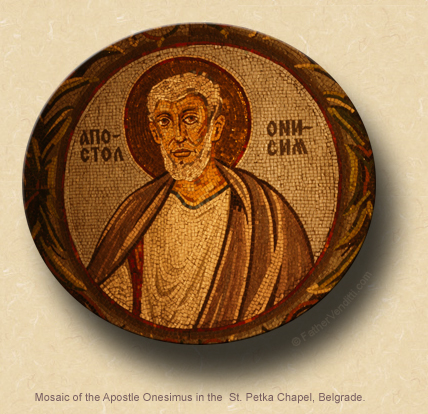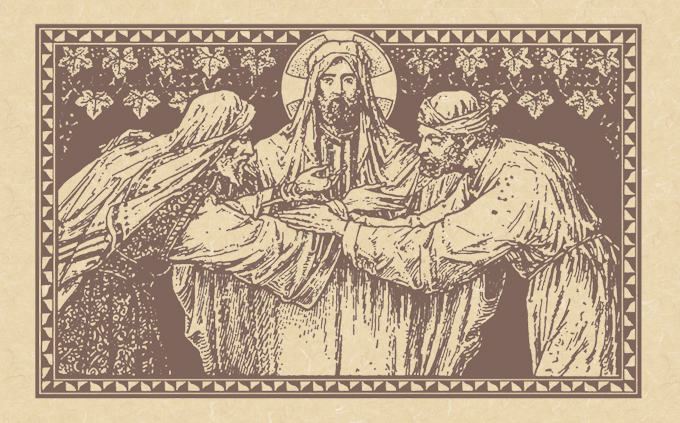A Collision of Coincidence and Providence.
The Memorial of Saint Leo the Great, Pope & Doctor of the Church.
Lessons from the secondary feria, according to the ordinary form of the Roman Rite:
• Philemon 7-20.
• Psalm 146: 7-10.
• Luke 17: 20-25.
|
…or, from the proper:
• Sirach 39: 6-11.
• Psalm 37: 3-6, 30-31.
• Matthew 16: 13-19.
…or, any lessons from the common of Pastors for a Pope, or the common of Doctors of the Church.
|
The Third Class Feast of Saint Andrew Avellino, Confessor; and, the Commemoration of Saints Tryphon, Respicius & Nympha, Martyrs.*
Lessons from the common "Os justi…" of a Confessor not a Bishop, according to the extraordinary form of the Roman Rite:
• Ecclesiasticus 31: 8-11.
• Psalm 91: 13-14, 3.
• Luke 12: 35-40.
|
If a Mass for the commemoration is taken, lessons from the proper:
• Romans 8: 18-23.
• Psalm 78: 10, 2.
• Luke 12: 1-8.
|
The Twenty-Fifth Thursday after Pentecost; and, the Feast of the Holy Apostles Erastus, Olympas, Rhodion & their Companions.**
Lessons from the pentecostarion, according to the Ruthenian recension of the Byzantine Rite:
• I Timothy 3: 1-13.
• Luke 13: 1-9.
FatherVenditti.com
|
 9:30 AM 11/10/2016 — When the Roman Missal was re-translated some time ago I wasn’t serving in the Latin Church; I was pastor of two Ruthenian Catholic parishes and, while I always had faculties to function in the Latin Church, being that I was technically a priest of the Latin Church, I never had the time to assist any Roman Catholic parish near me by taking an occasional Mass; I had two churches of my own. When my service in the Ruthenian Church was over and I returned to my own diocese—and came to this Shrine, incidentally—I had to get used to a Missal I had never seen, since the last Roman Missal I had used was the Second Edition, the translation of which was very different, as I’m sure many of you remember. The Third Edition we now have is superior in many ways, but the most important improvement—as far as I’m concerned—is in the Collects, what the Second Edition called the Opening Prayer. In the Second Edition, these prayers had been so dumbed-down and made so politically correct that they bore very little resemblance to the Latin originals. Some of the most beautiful ones in the current edition occur this time of year in this post-Pentecost season, and many—if not most—of them were composed by the man whose memorial we observe today: the outstanding Pope and Doctor of the Church, Leo I or, as he is known today, Leo the Great. 9:30 AM 11/10/2016 — When the Roman Missal was re-translated some time ago I wasn’t serving in the Latin Church; I was pastor of two Ruthenian Catholic parishes and, while I always had faculties to function in the Latin Church, being that I was technically a priest of the Latin Church, I never had the time to assist any Roman Catholic parish near me by taking an occasional Mass; I had two churches of my own. When my service in the Ruthenian Church was over and I returned to my own diocese—and came to this Shrine, incidentally—I had to get used to a Missal I had never seen, since the last Roman Missal I had used was the Second Edition, the translation of which was very different, as I’m sure many of you remember. The Third Edition we now have is superior in many ways, but the most important improvement—as far as I’m concerned—is in the Collects, what the Second Edition called the Opening Prayer. In the Second Edition, these prayers had been so dumbed-down and made so politically correct that they bore very little resemblance to the Latin originals. Some of the most beautiful ones in the current edition occur this time of year in this post-Pentecost season, and many—if not most—of them were composed by the man whose memorial we observe today: the outstanding Pope and Doctor of the Church, Leo I or, as he is known today, Leo the Great.
He was an Etruscan by birth, and was Pope when Attila the Hun invaded Italy. He was a great preacher, and by the shear force of his eloquence he was able to persuade Attila to bypass Rome, leaving it unharmed. He pulled off the same stunt again when Genseric threatened to invade and burn the city. He fought against a number of virulent heresies that threatened the true Faith, eventually calling the Council of Chalcedon to condemn them. He built a number of churches, built a monastery near Saint Peter’s, and finally died on this day in the year 461 after having served as Pope for twenty-two years, leaving behind a voluminous collection of eloquent writings.
So, if you’ve ever paid particular attention to the Collect prayed by the priest at the beginning of Holy Mass and been struck by it’s theology and beauty, you owe a debt of gratitude to Pope Saint Leo.
But we must turn our attention now to the Scripture lessons of today’s Mass, and this time not the Gospel but to the Apostolic lesson. You might recall that, the other day on Election Day, we had exposed the Blessed Eucharist after Mass to pray for our country, and prayed together the Litany of Divine Providence. We like to say that, with regard to God's Providence, there is no such thing as a coincidence; and, if you ever needed an illustration of that fact, it could easily be found in today's first lesson, which is taken from the Blessed Apostle Paul's letter to Philemon; for, it's truly a remarkable confluence of events that's being described here. It is the shortest of all Paul's letters—only one small chapter—and the most heart-felt.
Philemon was a Colossian, and he had a slave named Onesimus, who was a runaway. Onesimus ran away from Philemon, but—and here's where coincidence and Providence collide—he's captured by the Romans and happens to be imprisoned in the very same cell where Paul is being held temporarily while being taken to Rome to be tried for treason, where he is converted and baptized by Paul.  The two become great friends, and Paul has a mind to take Onesimus with him to Rome, but the Romans decide that their authority to prosecute the runaway slaves of Jews is sketchy at best, so they release him; and, Paul decides instead to send him back to Philemon as an assistant to his master in spreading the Gospel, and he's sending this letter along with him. The two become great friends, and Paul has a mind to take Onesimus with him to Rome, but the Romans decide that their authority to prosecute the runaway slaves of Jews is sketchy at best, so they release him; and, Paul decides instead to send him back to Philemon as an assistant to his master in spreading the Gospel, and he's sending this letter along with him.
It's interesting what he does here—and here's another example of how handicapped we are having to read the Scriptures in English when we should really be reading them in Greek—because the name Onesimus is actually a Latinization of a Greek slave name, Ὀνήσιμον, which is nothing more than the Greek word for “useful,” so it's a very common and appropriate slave name. And the irony of the situation is not lost on Paul, who uses his friend's name to make his point: he tells Philemon that he initially thought that Mr. Useful would be useful to him in Rome, but, given the circumstances, he now realizes that Mr. Useful will be even more useful to Philemon in his mission to preach the Gospel to the Colossians. He imposes on Philemon only one condition: that he cease treating Onesimus as a slave, and welcome him home as a brother and partner in the ministry. “Do not think of him any longer as a slave”, says the Apostle; “he is something more than a slave, a well loved brother, to me in a special way; much more, then, to thee, now that both nature and Christ make him thy own” (v. 16 Knox); and, he goes on to suggest that, if Philemon has any notion to regard Paul as a brother and partner in the ministry, he must now do the same for Onesimus, who has now become the brother of both of them in the Faith.
And in an almost lighthearted moment, the Apostle points out another “coincidence” of Divine Providence: he concedes that Onesimus wronged Philemon by running away, but points out that, had he not done so, he and Paul would never have met, depriving the Church of a very “useful” instrument in spreading the Gospel to a whole different class of people.
We tend to view the events of our lives in very black and white terms: this that happened to me is good; that which happened to me is bad. We seldom stop to reflect on what twists and turns the Lord is employing to bring us to some realization or resolution by means of some event or person he has injected into our lives. If we truly believe that it's Providence rather than coincidence that governs the journey of the Christian soul, then we shouldn't be surprised or closed to anything the Lord may throw our way. That’s one of the reasons that, when I choose to do the Bidding Prayers at Mass—which I don’t often do—I usually close them with the same prayer: “Merciful Father, hear our prayers, and grant us the grace to accept Your Will in all things.”

* Andrew Avellino was a holy priest who served as a member of the ecclesiastical court in Naples before entering the congregation of Clerks Regular, known today as the Theatine Order. He died at the foot of the Altar just as he was beginning Holy Mass in the year 1608.
Tryphon and his convert, the tribune Respicius, were scourged to death at Nicea under Decius in 250. Nympha was a Sicilian virgin; the date and circumstances of her martyrdom are unknown, but believed to be sometime in the beginning of the fourth century. Her commemoration is linked to Tryphon's and Respicius' because of writings by the monk Theodoric in 1005 which mention her relics being housed with theirs, with them eventually being transferred to the Church of St. Augustine in Rome by Pope Pius V.
** Olympus and Rhodion were Roman Christians to whom St. Paul sends his greetings at the end of his Epistle to the Romans. Sosipater, Tertius, Erastes and Quartus were Corinthian Christians, Tertius being the scribe who penned the Epistle to the Romans as it was dictated to him by the Apostle.
Some Eastern Churches add to this feast the Holy Martyr Orestes who was Treasurer of the City of Rome.
|

